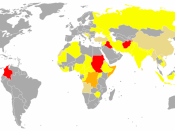Throughout history, migration has been one of the most enduring features of human experience. Over the centuries, there has been a multitude of reasons why people have sought to move from one part of the world to another. Nowadays the reasons prompting people to migrate include conflict, persecution and political instability; poverty, famine and natural disasters; and poor social conditions, lack of work and a desire to join family members in other countries. Many of these factors are inter-connected and in any individual situation there is likely to be a mixture of these factors.
Afghanistan1Algeria2Benin6Burkina faso30Chad13Congo6Eritrea228Ethiopia137Gambia22Ghana134Guinea19Guinea Bissau7Iraq4Ivory Coast170Liberia9Libya7Mali135Mauritania2Niger48Nigeria146Pakistan2Palestine7Senegal21Sene-al Sierra Leone10Somalia455Sudan50Syria2Tanzania1Togo55Tunisia 3Uzbekistan1Zimbabwe1Owing to its strategic position, exposed coastline and size, Malta is definitely much more vulnerable than other European countries when it comes to irregular migratory flows. Especially now, due to the success of the Spanish Frontex patrols, where it has been estimated that there has been a %60 reduction in arrivals making it more likely for immigrants to choose an alternative/easier route (Through Malta's SAR zone).
Year20002001200220032004200520062007Number of Immigrants245716865021388182217801690Before 2001 the problem wasn't apparent, as only 24 immigrants had landed on our shores (in the year 2000) and 57 in 2001. The magnitude of the problem was clear when in 2002 1,686 immigrants landed on our shores, which tested the capabilities of the government in managing the problematic situation.
At the time the absence of a mechanism to process claims of asylum seekers was clear and applications had to be sent to the UNHCR in Rome and the Maltese Government will implement the decisions taken in order to be in line with international standards.
"However, in the year 2000 Malta enacted the Refugees Act. Besides defining the rights and duties of asylum seekers and refugees, this Act, which came into force on 1st October 2001, also provided for the establishment...


